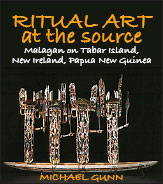Ritual Art At The Source Malagan on Tabar Island, New Ireland, Papua New Guinea
In Preparation
Some of the most fascinating masks and figurative sculpture created in the
South Pacific have come from the Tabar Islands of New Ireland in Papua New Guinea. Ever
since this art tradition was brought to Western attention by Abel Tasman in 1643, scholars
have been seduced by the urge to interpret the symbolism apparent on many of these artworks.
Explorers first, then whalers, traders, missionaries, and professional artefact collectors managed
to bring to the West perhaps 5000 works of art from northern New Ireland, including
Tabar, and many of the surviving artworks are to be found today in museums and private
collections throughout the West.
Michael Gunn was one of those scholars who was seduced by the almost irresistible urge
to interpret the symbolism found on malagan artworks from northern New Ireland. After
several years of preliminary research in museums in the West, he traveled to the Tabar Islands,
legendary source of the malagan ritual that resulted in the creation of many of these masks and
painted wooden figures. He had anticipated that this work would be a form of ethnohistory
– asking the old men about a tradition long dead, more an exercise in the effects of memory
upon the re-creation of culture. But to his surprise Gunn found that malagan was still alive and
actively practiced by the 2500 people living on Tabar in 1982.
This book results from a bargain that Gunn struck with some of the Big Men on Tabar – they
would direct his research, and he would eventually publish it. His initial interest in symbolism
soon dwindled when he was repeatedly told that ‘we could reinvent meanings for you, if you
want, but its our reality that we want you to document’. ‘Our reality’ entailed visiting every
village on Tabar, locating each of the owners of the art-producing malagan ritual, then asking
him (or occasionally her) which part of the malagan ritual property he or she owned. This
resulted in descriptions of more than 450 distinct works of malagan sculpture and masks, as
well as providing the basis for an understanding of a structure of the malagan subtraditions
on Tabar – the structure that contains all the ownership rights of malagan. For it became
quite apparent that all aspects of malagan were controlled by copyright, and that no malagan
object could be created outside the copyright system. But it was also made clear that
non-malagan art objects (including masks) could be created and used outside but in close
proximity to the malagan system.
In addition to providing a description and analysis of the malagan art-producing ritual traditions
as practiced on Tabar in the late 20th century, this book also includes a number of photographs
of malagan figures and masks, as well as other objects of material culture that were collected
from the Tabar Islands during the 19th and early 20th centuries.
CONTENTS:
Preface
Acknowledgements
List of maps, illustrations and tables
1. Introduction
2. Malagan ritual behaviour: Death and burial sequence
3. Malagan ritual behaviour: Commemorative sequence
4. Social and cultural connections of malagan
5. Taxonomic structure and typology of malagan on Tabar
6. Conclusions
Appendices
A. Malagan big-name subtraditions and components
B. Selected tap transcripts of oral traditions, recorded from Tabar, 1982, 1983-84
Glossary
References
Index
AUTHOR:
Michael Gunn became fascinated by the art of New Ireland when he worked
as a volunteer the Australian Museum in Sydney in 1980. Later, as a curator at the Northern
Territory Museum in Darwin, Gunn and his wife, Bee, documented malagan ritual on the Tabar
Islands. From 1994 to 1999, while working as a curator at the Metropolitan Museum of
Art in New York, he was able to examine thousands of pieces from New Ireland, which
were collected in the 19th century and are now in museums in Europe. He is currently
curator for Oceanic Art at the Saint Louis Art Museum, and has just returned from his
third field-trip to New Ireland.
|
|

AUTHOR:
Michael Gunn
STATUS:
Forthcoming
PRICE:
$69.95
ILLUSTRATIONS:
Numerous colour and black-and-white photographs, maps and diagrams
FORMAT:
Portrait; hardcover; c. 350 pages
DIMENSIONS:
240 x 214 mm
ISBN:
1863332359
|
|

